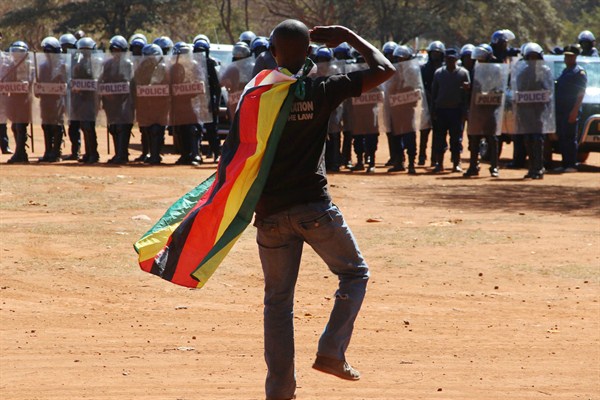Recent elections in several African countries have extended the rule of long-time leaders, painting a bleak picture of ordinary citizens’ ability to press for political and social change. Amid violent government crackdowns, many opposition groups are also marred by their own disunity. But activists haven’t backed down, and grass-roots organizations are taking matters into their own hands, demanding better governance and more rights. World Politics Review’s 10-article compilation looks at the challenges Africa’s popular and political movements face and some of the progress they’ve made.
The following 10 articles are free to non-subscribers until Sept. 15.
The State of Organized Political Opposition
Ethiopia’s Regime Prioritizes Power Over Reform as Ethnic Protests Continue
In Ethiopia’s two largest ethnic regions, anti-government rallies turned into a bloodbath in early August as security forces again used live ammunition against protesters. Reporting from Addis Ababa, William Davison writes that such sustained discontent poses a major challenge to Ethiopia’s government, as ethnic majorities like the Oromo assert their rights. Yet with the opposition exiled, imprisoned or otherwise repressed, there is a lack of potential partners for dialogue.
In Ethiopia’s two largest ethnic regions, anti-government rallies turned into a bloodbath in early August as security forces again used live ammunition against protesters. Reporting from Addis Ababa, William Davison writes that such sustained discontent poses a major challenge to Ethiopia’s government, as ethnic majorities like the Oromo assert their rights. Yet with the opposition exiled, imprisoned or otherwise repressed, there is a lack of potential partners for dialogue.
Things are not going well in Zimbabwe, with a tumbling economy and political infighting over the longstanding question of who will succeed 92-year-old President Robert Mugabe. But in a shift, Zimbabweans have taken to the streets, holding massive protests prompted by a pastor’s call to mobilize. In July, Jeremy Youde took stock of the largest protests in Zimbabwe in years, and what could come next.
The Republic of Congo rarely captures global attention, but months of military attacks on civilians, including airstrikes, made instability there impossible to ignore earlier this year, even though France and other European countries have failed to speak out against the violence. The situation is dire with an ongoing crackdown on the political opposition, but as Karina Piser wrote in June, some activists still haven’t given up hope.
In December, Gambian President Yahya Jammeh, in power since 1994, will face a serious political test as citizens go to the polls after months of sporadic protests. In May, Michael W. Baca argued that a cocktail of developments, from large-scale street demonstrations to international censure for the government’s alleged human rights violations, could lead to months of turmoil around the vote. Could those forces unseat Gambia’s strongman?
The lead-up to Chad’s presidential election in April was marked by unusual protests, given a formal ban on demonstrations. As Celeste Hicks reported, Chad’s political opposition and strong labor unions capitalized on visceral anger in February over the alleged rape of a teenage girl by a gang that included relatives of several high-profile government figures. The opposition failed to present a credible unity candidate, however, and Deby successfully extended his decades-long rule. But what does the future hold with Chadians more willing to speak out?
In February, President Yoweri Museveni won another re-election in Uganda, in a vote marred by violence and allegations of fraud by the political opposition. Peter Dörrie and Simone Schlindwein’s March reporting from Kampala revealed mounting popular frustration after the election. But even though Museveni faces a potential succession crisis, a neutered opposition and the government’s routine suppression of protests have closed off many avenues for reform.
Change From the Grass Roots
After significant progress over the past decade, gay rights activists in Cameroon were dealt a disheartening setback in June when Cameroon’s parliament voted to retain a notorious anti-gay provision in the penal code dating back to 1972. Reporting from Yaounde in August, Robbie Corey-Boulet catalogued the way gay rights activists there have gradually chipped away at taboos about sexual minorities.
With its slums, trash heaps and poor infrastructure, Nairobi, one of Africa’s largest cities, reflects not only the explosive urbanization of much of the developing world, but the risks of being ill-equipped to deal with a rapidly growing urban population. But some promising initiatives are underway, from dealing with traffic congestion to cleaning up city streets. In her June article, Nairobi-based journalist Abigail Higgins looked at the grass-roots groups working to make the city a more habitable place.
Senegal’s hip-hop artists have come a long way since their emergence in the 1980s. Reporting from Dakar in January, Amanda Fortier looked at the genre’s evolution. What was once considered a passing trend has become a “legitimate—if not radical—instrument for change, stirring Senegal’s youth to action.” Through international funding and support, hip-hop in Senegal continues to gain political legitimacy.
Burkina Faso’s elections last November were deemed the most democratic in its history, after a year and a half of turbulence around former President Blaise Compaore’s ouster and a failed coup attempt by his military supporters. In his analysis of the post-election climate, Ernest Harsch noted that despite that progress, the young Burkinabe behind the protests that brought down Compaore are encouraging fellow citizens to remain vigilant and hold the government to its promises.

